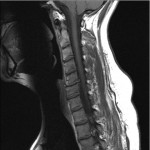 Patients with 2-level symptomatic cervical disc degeneration fare better in terms of future secondary surgeries when their discs are replaced rather than fused, a new study shows.
Patients with 2-level symptomatic cervical disc degeneration fare better in terms of future secondary surgeries when their discs are replaced rather than fused, a new study shows.
“We found out that the results are really better,” first author Robert Jackson, MD, from Orange County Neurosurgical Associates in Laguna Hills, California, told Medscape Medical News.
Dr. Jackson presented the study, which used Mobi-C cervical disc prostheses (LDR Spine USA), here at the Congress of Neurological Surgeons (CNS) 2013 Annual Meeting.
The traditional treatment for cervical disc disease is to fuse the affected discs. “The problem with fusing the spine is that you lose range of motion of the cervical spine and that it wears out the discs above and below so that you need another fusion,” said Dr. Jackson.
Disc replacement is intended to provide more mobility. This approach has been available in Europe for more than 10 years, and the U.S. Food and Drug Administration (FDA) first approved such a device in 2004.
Several studies have shown better results with the implants than with fusion surgery, but few have looked at treatment of 2 levels of the cervical spine, said Dr. Jackson.
For this study, Dr. Jackson and his colleagues randomly assigned 575 patients with cervical degenerative disc disease to 4 groups: 164 patients had 1-level disc replacement with Mobi-C implants, 81 had 1-level anterior cervical discectomy and fusion (ACDF), 225 had 2-level disc replacement with Mobi-C implants, and 105 had 2-level ACDF.
After 2 years, more patients who underwent fusion needed secondary surgery than did those who underwent replacement. The difference was statistically significant.
Table. Rates of Secondary Surgery by Baseline Treatment
| Surgery | 1-Level Fusion | 1-Level Replacement | 2-Level Fusion | 2-Level Replacement |
| Secondary surgery, same level (%) | 8.6 | 2.4 | 12.4 | 3.6 |
| Secondary surgery, adjacent level (%) | 4.9 | 1.2 | 3.8 | 0.9 |
The researchers have since followed the patients for another 2 years and are finding a similar pattern, with less secondary surgery needed among the patients undergoing disc replacement, said Dr. Jackson. “The 4-year results are even better,” he said.
The Mobi-C has been available for several years in Europe, but only won approval from the FDA on August 7, 2013, for 1-level disc replacement, and on August 23, 2013, for 2-level disc replacement.
The device consists of 2 cobalt-chrome alloy endplates that sandwich a polyethylene insert. It is suitable for patients aged 19 to 65 years, said Dr. Jackson.
The device costs about $2000 to $3000, which makes the surgery more expensive than fusion, he said. Although Medicare will pay for it, some private insurance companies will not, he said. “Little by little they are coming around.”